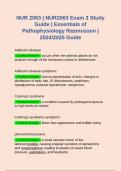NUR 2063 | NUR2063 Exam 3 Study
Guide | Essentials of
Pathophysiology Rasmussen |
2024/2025 Guide
Addison's disease
- Correct Answer - occurs when the adrenal glands do not
produce enough of the hormones cortisol or aldosterone
Addison's disease symptoms
- Correct Answer - bronze pigmentation of skin, changes in
distribution of body hair, GI disturbances, weakness,
hypoglycemia, postural hypotension, weight loss
Cushing's syndrome
- Correct Answer - a condition caused by prolonged exposure
to high levels of cortisol
Cushing's syndrome symptoms
- Correct Answer - Moon face appearance and buffalo hump
phenochromocytoma
- Correct Answer - a small vascular tumor of the
adrenal medulla, causing irregular secretion of epinephrine
and norepinephrine, leading to attacks of raised blood
pressure, palpitations, and headache.
,Hyperthyroidism
- Correct Answer - excessive activity of the thyroid gland
Hyperthyroidism symptoms
- Correct Answer - heat intolerance, weight loss, sweating,
anxiety, irritability, hyperactive reflexes, palpitations,
EXOPTHALMOS (lid lag when gaze moves from downward to
upward)
Hypothyroidism
- Correct Answer - condition of hyposecretion of the thyroid
gland causing low thyroid levels in the blood that result in
sluggishness, slow pulse, and often obesity
Hypothyroidism symptoms
- Correct Answer - Fatigue, lethargy. Modest weight gain with
anorexia. Dry, coarse skin and cold intolerance. Swelling of
face, hands, and legs. Constipation. Weakness, muscle
cramps, arthralgias, paresthesias, impaired memory and
hearing.
UTI
- Correct Answer - urinary tract infection
UTI signs and symptoms
,- Correct Answer - Burning, frequency, urgency, foul smell,
sediment, abdominal pain, chills, fever, darkness, confusion
Why are women more susceptible to UTIs?
- Correct Answer - shorter urethra and closer to anus
cystitis
- Correct Answer - inflammation of the urinary bladder
Cystitis symptoms
- Correct Answer - 1) urinary frequency
2) urgency
3) burning
4) dysuria
**Young, otherwise healthy women are the most common case
presented.
urinary incontinence
- Correct Answer - inability to control urination
overflow incontinence
- Correct Answer - inability to empty the bladder completely,
dribbling or weak stream. > men caused by damage to bladder
or nerves or blockage
chronic overdistension
, - Correct Answer - Condition caused by a perceived inability to
interrupt work to void. This chronic avoidance of emptying the
bladder results in detrusor muscle areflexia and overflow
incontinence. Also called nurse's bladder and teacher's bladder.
mixed incontinence
- Correct Answer - the combination of stress incontinence and
urge incontinence
functional incontinence
- Correct Answer - urine loss caused by the inability to reach
the toilet because of environmental barriers, physical
limitations, loss of memory, or disorientation
gross total incontinence
- Correct Answer - continuous leaking of urine or the periodic
uncontrollable leaking of volumes of urine
transient incontinence
- Correct Answer - temporary or occasional incontinence that is
reversed when the cause is treated
Predisposing factors of bladder cancer
- Correct Answer - Working with chemicals in laboratories and
industry
Particularly aniline dyes, rubber, aluminum
Cigarette smoking




